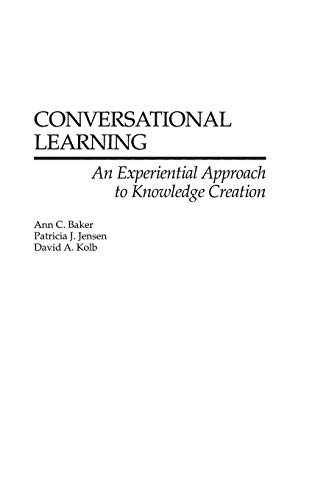Synopsis:
Despite conflicting belief systems and other divisive problems, people can still learn from each other to create new knowledge. The medium is conversation. This challenging new book asserts that business conversations can be seen as social experiences through which we discover new ways of seeing the world, destroying the barriers between us. When this occurs, new knowledge can emerge or be developed. How can people learn from their differences, rather than be divided by them? One way is by creating conversational spaces-areas where conversation occurs. The authors show how such spaces are created, maintained, and enhanced, and how they are used to transform different interpretations and perspectives into new common understandings. With illustrations and case studies, the authors demonstrate the practical value of conversational learning in diverse organizational settings. Emphasis is shifted from techniques that are essentially insensitive to different contexts, attitudes, and beliefs, focusing instead on a theory of learning that is more social and interactive. This remarkable new source of explanatory theory validates an intensely pragmatic way to help organizations get people talking to one another, thereby advancing the well being of the organizations and those within them.
Review:
"How do we come to understand one another and ourselves through conversation? David Kolb and his colleagues explore this timely topic by extending his Experiential Learning Theory model to an interpersonal context. True to their beliefs, they make room for the readers, inviting us to engage in conversation with this provocative text."-David Hunt OISE, University of Toronto
"This book contains insightful discussions of what conversation is and what it does for the learner. It explores a wide range of challenges for the creation of the kinds of conversations that produce learning. A particularly interesting theme addresses the struggles of students as they learn to deal with the responsibility of creating their own conversations. What does one do when students demand teaching? That is, when they insist that the teacher must talk and must deliver knowledge? As is the case with any work associated with David Kolb, the book is full of deep insights and warm invitation to participate. It will be of interest and value to anyone who thinks seriously about human learning and its transforming power."-James E. Zull Professor of Biology, Director of the University Center for Innovation in Teaching and Education, Case Western Reserve University, Cleveland, Ohio
"Baker, Jensen, and Kolb's book brings an important new focus to the exploration of learning. Drawing on the theories of Piaget, Vergotsky, Gadamer, and Kolb, among others, the authors describe and explain the nature of conversation and the ways it furthers learning using examples and stories as well as carefully reasoned analogies and reframed ideas. The book also explores various kinds of conversations in different settings, among different groups. This work adds a significant dimension to the meaning of learning and it is extremely useful for teachers, scholars, and researchers as well as policy makers and administrators. This work takes David Kolb's seminal book, Experiential Learning and examines the theory of experiential learning through the medium of conversations with examples in multicultural settings, cyberspace, organizational development and higher education."-David Justice Vice President, Lifelong Learning, DePaul University and Pamela Tate President and CEO, Council for Adult and Experiential Learning
"Baker, Jensen, Kolb and associates invite us to explore a new research domain with them--one that sees the ordinary and taken-for-granted act of conversation as fundamental to how we learn about and construct our selves, others, and the world. Using the same conversational qualities that they have identified as being conducive to learning and personal growth, they synthesize a vast body of related research, develop a dialectical theory of conversational learning, and present field studies, introspective accounts and probing interviews to illuminate the learning processes in good conversation. Conversations that flow well and feel true are fragile and require a nurturing conversational space which provides safety for differences to be engaged and for transformational learning to occur. Scholars of learning and human potential will be inspired to rethink their own research in ways that better take into account the field of conversational learning developed in this stimulating book."-Richard Boland Professor, Weatherhead School of Management, Case Western Reserve University
"About this title" may belong to another edition of this title.
![]()
